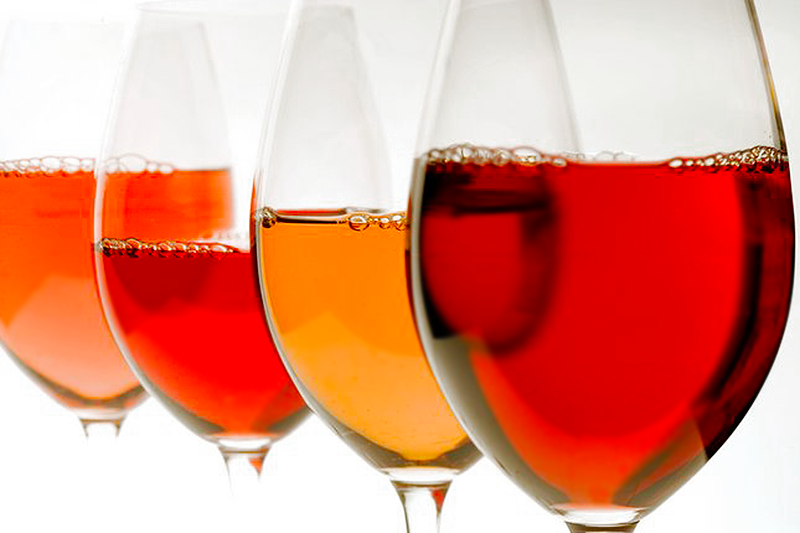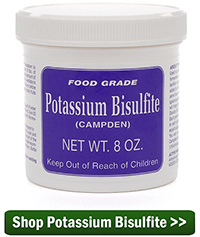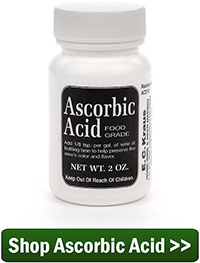 I recently made wine kit and bottled it at the end of October. While the taste of the wine is fine, any wine leftover in the bottle (re-corked) for two days starts turning orange. The wine fermented correctly, all directions were followed, and the wine was filtered prior to bottling. Why is my wine turning orange? Is this a health hazard?, and is there anything I can do now to prevent this colorization?
I recently made wine kit and bottled it at the end of October. While the taste of the wine is fine, any wine leftover in the bottle (re-corked) for two days starts turning orange. The wine fermented correctly, all directions were followed, and the wine was filtered prior to bottling. Why is my wine turning orange? Is this a health hazard?, and is there anything I can do now to prevent this colorization?
Terry – OH
—–
Dear Terry,
The reason why your wine is turning orange is very simple: your wine is oxidizing.
Oxidation is a process that occurs when a wine is exposed to excessive oxygen for too long of time. In your case, once the cork is pulled from a wine bottle, you are allowing air to enter with the wine. This allows the oxidative process to start.
This is no different that when an apple core turns brown. The first signs of your wine oxidizing will show itself as a light-orange tinge that will later turn to a light-amber, then dark-amber, then eventually brown. If you have ever seen a  Sherry or a Port, these are examples of wines that are oxidized on purpose.
Sherry or a Port, these are examples of wines that are oxidized on purpose.
The wine is perfectly safe to drink. There is nothing going on that would make the wine harmful. However, you will probably notice some deterioration in the wine’s overall character. This is normally first noticeable as a loss of fruitiness and a collapse of any complexities the wine may have had. In other words, the wine will typically start to have a flat and lifeless impression. Then as the oxidation progresses on you may start to notice a caramel or raisin smell, then in later stages, as a caramel or raisin taste.
There are some things you can do to help keep your wine from turning orange and experiencing the other effects of oxidation:
- Add sulfites to the wine at bottling time.
 Doing this will delay the oxidative process once the bottle has been opened. It will also help the wine to keep better while aging in the wine bottle.
Doing this will delay the oxidative process once the bottle has been opened. It will also help the wine to keep better while aging in the wine bottle.
- Add ascorbic acid to the wine at bottling time. This will help to slow the effects of oxidation by lowering the wine’s pH.
- Keep partial bottles in the refrigerator. Cooler temperatures will slow down the oxidative process as well as keeping the wine out of direct UV rays such as sunlight.
- And, then there’s the solution I find most effective of all… drink the whole bottle!
If you want to read more about oxidation and why a wine will start turning orange you may also want to take a look at the article, “Controlling Oxidation In Your Homemade Wines.”
Happy Wine Making,
Ed Kraus
—–
Ed Kraus is a 3rd generation home brewer/winemaker and has been an owner of E. C. Kraus since 1999. He has been helping individuals make better wine and beer for over 25 years.

I preserve a partial bottle of wine for later consumption by pouring, for example, half of a full bottle into a 375 ml wine bottle (with a screw top) immediately after opening the full bottle. Seal up the half bottle, put it in the fridge and drink the rest of the full bottle that you started with. I also have a 300 ml Ehrlenmeyer flask with a ground glass stopper that works well for this purpose. You could use the 12 oz. glass bottles that you buy tonic or club soda in. Whatever container you use, just be sure to pour the wine into it immediately after opening the full bottle, pour it gently to avoid exposure to too much air, and fill it up to the top.
To Steve’s comments
To exclude all those complicated pouring into smaller containers why not to finish all the bottle once it is open?
I made some beautiful red muscadine wine and when I bottled it, I added one campden tablet per gallon and the entire five-gallon batch turned orange. Campden tablets will turn your wine orange.